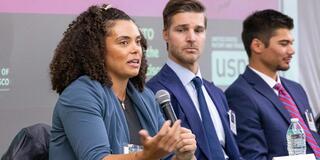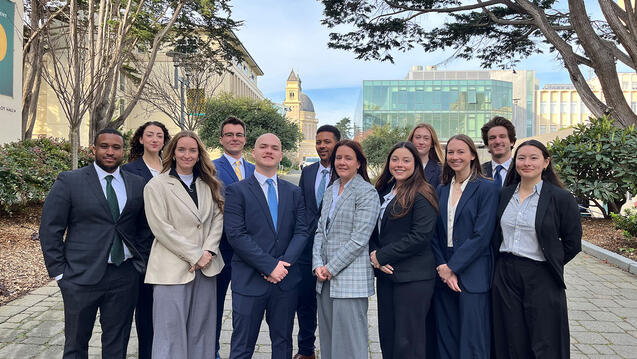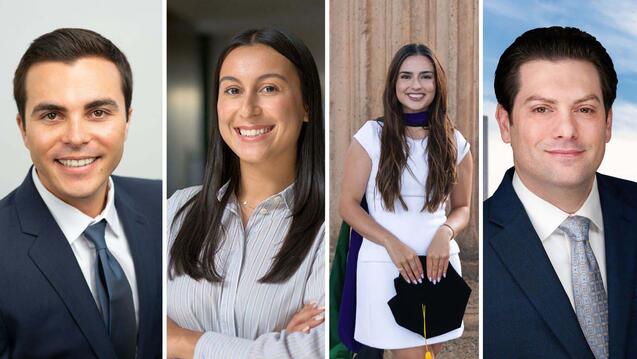Exploring Name, Image, and Likeness Laws

On November 15, 2024, USF Law, in collaboration with the U.S. Patent and Trademark Office (USPTO), hosted a daylong event examining the evolution of name, image, and likeness (NIL) laws for student-athletes. USF Law Dean Johanna Kalb welcomed attendees and reflected on the “revolutionary” changes to NCAA policy and the implications for “college athletics, for schools, for the athletes themselves, and for the fans who support them.”
The landscape of college sports changed dramatically in 2021 when the Supreme Court unanimously ruled in NCAA v. Alston that the NCAA was subject to antitrust laws and that its athlete compensation limits violate those laws. The NCAA in turn adopted an NIL policy that allowed student-athletes to profit from their image and likeness with few restrictions. During their fireside chat, Super Bowl Champion Dwayne Allen and USPTO Deputy Director Derrick Brent discussed the resulting challenges high school students face in the college recruitment process. Allen, reflecting on his own experience as a first-generation college student recruited to play Division I football, highlighted the complexity of the process and the added pressure NIL can bring. “There was already so much to digest without worrying about who was the highest bidder,” he said. He further stressed the importance of educating both parents and students about NIL opportunities and risks.
One of the many hurdles that legislators and governing bodies still need to address is the reach of NIL laws. Professor Jessica Fajfar, director of USF’s Internet and Intellectual Property Justice Clinic, served as moderator for the first panel discussion of the day on NIL basics and explained the overlap of right of publicity laws and other forms of intellectual property like copyright and trademark. While right of publicity laws include endorsement rights, merchandising rights, and the right against virtual impressment, Fajfar noted that “collegiate athletes aren’t currently compensated for their broadcast rights.”
Jason Lott, USPTO Managing Attorney for Trademark Outreach, further explored this topic in his presentation on trademarks and NIL. He discussed how student-athletes can monetize their personal brands by registering trademarks for products like merchandise. Lott also provided practical resources, including the USPTO’s Trademark Basics Registration Toolkit and the Trademark Assistance Center, to help attendees navigate the complexities of NIL.
The conference’s keynote speaker, California State Senator Nancy Skinner, author of Senate Bill 206, the Fair Pay to Play Act, underscored the transformative impact of NIL rights. Before SB 206, Skinner explained, “college athletes were the only people in the U.S. who didn’t have rights to their name, image, or likeness.” She emphasized that student-athletes are the driving force behind a multibillion-dollar industry and deserve fair compensation, adding, “The revenue generated is from the work and the talent of the student-athletes. They are the labor.”
The conference also featured USF Law students Stephanie Cohen ‘26, Katrina Garry ‘25, and Joe Soberon ‘26, USF Athletic Director Larry Williams, alumnus Matt Quinlan ‘04, USF faculty members Roy Eisenhardt and Daniel Rascher, panelists Mariah Cooks, Casey Faucon, Dr. Molly Harry, and Wayne Stacy, and USPTO General Counsel David Berdan.


